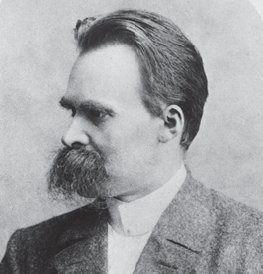God is dead.
—Nietzsche
Traditional morals are outdated. The strong can abuse the weak. The arrival of Christianity in Europe was a curse. Germans drink too much beer.

Friedrich Nietzsche (1844–1900), one of the most influential figures in modern philosophy, specialized in provocative musings that shocked his readers but have inspired generations of artists and skeptics. Born in Germany, Nietzsche devoted much of his short career to attacking the underlying precepts of Western civilization—above all, the code of Christian ethics that formed its core.
Nietzsche was born in a rural area near Leipzig and named in honor of the Prussian king, Friedrich Wilhelm IV (1795–1861). In 1867, Nietzsche entered the Prussian military and suffered a serious chest injury during training. He was released from the army, but his wounds never fully healed, and he suffered from poor physical and mental health for the rest of his life.
Returning to university life, Nietzsche obtained his first teaching position in 1869 and began publishing three years later. He wrote about a wide range of topics, including morals, art, and music—especially that of his friend Richard Wagner (1813–1883). Nietzsche’s writing was not concerned with art directly, but rather with its philosophical implications. For instance, in Birth of Tragedy, Nietzsche finds hope in the ancient literary form of the Greek tragedy, finding that it contains a full range of emotional experiences that represent the fullness and meaning of life.
Nietzsche’s philosophy has been controversial since its publication. One of his most notorious and misunderstood concepts is the “will to power,” an argument that all people are inclined to seek power and that the will to have power is stronger than the “will to survive.” A version of the concept was embraced by the Nazis fifty years later.
In poor health due to chronic headaches and vision problems, Nietzsche resigned from teaching in 1879. He suffered a total nervous breakdown on January 3, 1889. Incapacitated by his mental health problems, he moved back in with his mother in Germany and later died of pneumonia at age fifty-five while under his sister’s care.
ADDITIONAL FACTS
- Nietzsche’s final breakdown occurred in the city of Turin, Italy. In one of the city’s main squares, he supposedly witnessed a rider whipping his horse, ran to the horse to protect it, and then collapsed.
- About 150,000 copies of one of his books, Thus Spoke Zarathustra (1883–1885), were distributed to German troops as a morale booster during World War I.
- Despite his injuries, Nietzsche served in the Prussian army during the Franco-Prussian War (1870–1871). He worked in a military hospital caring for wounded soldiers.
